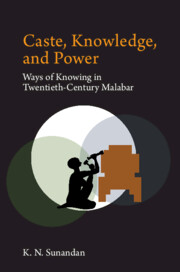Book contents
- Frontmatter
- Contents
- Acknowledgements
- Notes on Transliteration
- Introduction: Caste, Knowledge, and Power
- 1 An Ashari World of Knowing
- 2 An Ashari World of Ignoring
- 3 A Nampoothiri World of Acharam
- 4 Nampoothiris and the Order of Knowledge
- 5 Asharis and the Order of Knowledge
- Postscript: Towards an Artisanal Way of Practice of Knowing
- Bibliography
- Index
Introduction: Caste, Knowledge, and Power
Published online by Cambridge University Press: 11 October 2022
- Frontmatter
- Contents
- Acknowledgements
- Notes on Transliteration
- Introduction: Caste, Knowledge, and Power
- 1 An Ashari World of Knowing
- 2 An Ashari World of Ignoring
- 3 A Nampoothiri World of Acharam
- 4 Nampoothiris and the Order of Knowledge
- 5 Asharis and the Order of Knowledge
- Postscript: Towards an Artisanal Way of Practice of Knowing
- Bibliography
- Index
Summary
I am not your data, nor am I your vote bank,
I am not your project, or any exotic museum object,
I am not the soul waiting to be harvested,
Nor am I the lab where your theories are tested,
I am not your cannon fodder, or the invisible worker,
or your entertainment at India [H]abitat [C]entre,
I am not your field, your crowd, your history,
your help, your guilt, medallions of your victory,
I refuse, reject, resist your labels,
your judgments, documents, definitions,
your models, leaders and patrons,
because they deny me my existence, my vision, my space,
your words, maps, figures, indicators,
they all create illusions and put you on pedestal,
from where you look down upon me,
So I draw my own picture, and invent my own grammar,
I make my own tools to fight my own battle,
For me, my people, my world, and my Adivasi self!
— Abhay XaxaThe poem by Abhay Xaxa is the inspiration and provocation for this book, and the book is an exploration of the historical contexts in which the oppressive system of domination through knowledge, as explained in the poem, emerged. In the long history of human societies, the entanglement of power–knowledge2 is rather a recent one. Emperors, kings, popes, witches, priests, landlords, shamans, poets, and even philosophers wielded power through other means: religion, ritual, military, art, rhetoric, or magic. Although knowledge sometimes helped sustain, grab, or increase power, it was not a necessary ingredient for the deployment of power. Only in the era of European imperialisms and colonialisms, knowledge became a measure of civilization and then an integral part of the exercise of power. Thereafter, knowledge experts built their own temples of power, from where power flowed out through various channels of knowledge. Universities, research institutes, and schools, aligning with the State, participated in ordering, categorizing, and controlling the population.
- Type
- Chapter
- Information
- Caste, Knowledge, and PowerWays of Knowing in Twentieth Century Malabar, pp. 1 - 23Publisher: Cambridge University PressPrint publication year: 2023



